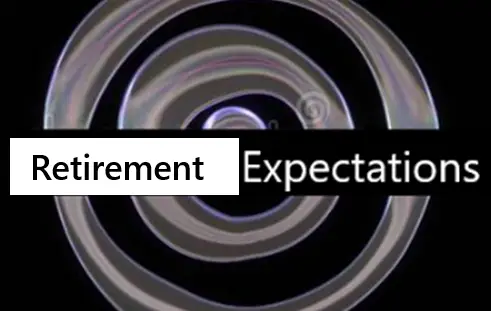Are lower expectations the key to a successful retirement?
We demand a lot out of retirement. What if the key to a successful retirement is lower expectations?
We spend a third or more of our life retired. After all that hard work, should we not expect some happiness or at least fun? What is your expectation of retirement?
Expectations Lead to Unhappiness
What are expectations?
If expectations are the certitude that something positive or negative will happen, we set ourselves up for a bumpy ride.
We certainly can expect the sun to rise tomorrow and plan for our eventual demise. Still, these expectations are based on natural phenomena.
Yes, eventually, the sun won’t rise, and eventually (in the infinite multiverse), well, I give up. Everything is possible.
If you are healthy today, most tomorrows you will wake up healthy as well. Don’t abandon logic and usually bet the odds.
But expectations in retirement lead to unhappiness. Both when fulfilled and when unfulfilled.
Fulfilled Expectations Are Not Happiness
If I don’t get what I want (or if I do!), either way, if I expect an outcome, my happiness is diminished?
This is the reason to lower retirement expectations. If you get what you expect, gratitude decreases. If you don’t get what you expect, you get gratuitous pain.
Let’s look at both.
Gratuitous Pain in Retirement
The concept of “gratuitous pain” is from the pages of Happiness Is A Serious Problem.
The author gives the example of waking up with a mass somewhere on your body. You see your doctor and then wait a month for the consultation, biopsy, and pathology results.
The day your path comes back benign, you feel relief. It might be one of the happiest days of your life!
But what is different between the day you get the results and the day before when you had spent a frustrating month waiting for the system to churn you through?
You spent a month of anxious dread expecting the worst. And relief when you get a result that was true the whole time? What happened to that mass that day? Did it somehow change, or did your thinking about it change? You thought yourself into gratuitous pain by feeling the mass and then seeking medical attention (with all the subsequent worries). The mass didn’t cause the problems; your expectations of the mass did.
Nothing in your health changed after the biopsy results, yet you are suddenly happy. Or, perhaps, you made yourself unhappy with the waiting, and then with the result (the solution of the expectation), you were happy that you were just as healthy as the day before you found the mass in the first place.
“But Ideally, we should awaken every day and be as happy about our good health as if we had just received the wonderful news that a lump was diagnosed as benign” ~Dennis Prager
Gratitude is Joy in Retirement
Brene Brown takes it a step further, stating: “…the difference between happiness and joy (is) the difference between a human emotion connected to circumstances and a spiritual way of engaging with the world connected to practicing gratitude.”
Joy adds to happiness by ascribing a spiritual quality to joy provided by gratitude.
It is not the other way around. Joyful people are not grateful for their good results in life. Grateful people (who are grateful because they have low expectations) are joyful. Daily practice gratitude. It’s a path to cultivating spirituality and happiness in your life.
How to be Happy in Retirement
Either practice gratitude or reduce your expectations. How about that for a prescription for retirement happiness?
To reduce expectations: acknowledge that expectations are harmful and express gratitude for all the good already in your life. This smacks of a spiritual process. Lower fears, admit faults and have faith. Fear of scarcity is the thief of joy. Know what is enough.
To be happy in retirement, one must avoid scarcity. We live in a culture of scarcity. Instead of scarcity and fear, reduce expectations and find joy in the ordinary moments. Let expectations go and delight in the moment.
That spiritual pursuit interests me; let uncertainty guide me to trust or believe that gratitude provides joy.
The opposite of faith is not doubt, but certainty. Anne Lamott
Lower expectations in retirement offer uncertainty, vulnerability, and a lack of expectations. Be that as it may, happiness happens when gratitude is a continuous spiritual practice. Grateful for the unexpected moments of joy, and don’t fear anything but what is. Seeking certainty is seeking scarcity, just as joy is being grateful for what is already yours.
